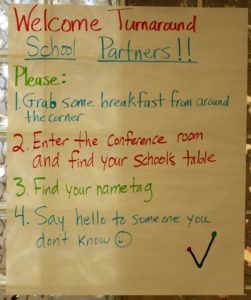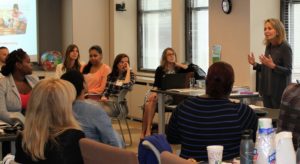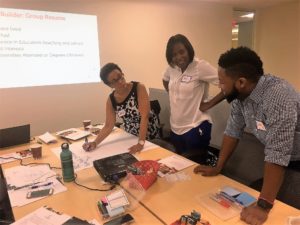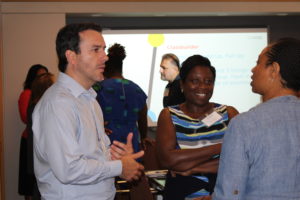Turnaround for Children’s Annual Leadership Retreat
 During our Annual Leadership Retreat, Derek Smith, Turnaround’s Chief Program Officer, led a discussion on change management, “We’re not 100 percent clear on where we’re going, but we’re clear on the ‘why’ and folks are leaning in.” For Turnaround, the “Why” has always been our students. Many schools across the United States are stuck in persistent underperformance and failure because they have not been designed or equipped to address the impact of adversity on the developing brain. Turnaround believes that our students deserve more, so we’re leading efforts to connect the dots between poverty, stress and academic performance.
During our Annual Leadership Retreat, Derek Smith, Turnaround’s Chief Program Officer, led a discussion on change management, “We’re not 100 percent clear on where we’re going, but we’re clear on the ‘why’ and folks are leaning in.” For Turnaround, the “Why” has always been our students. Many schools across the United States are stuck in persistent underperformance and failure because they have not been designed or equipped to address the impact of adversity on the developing brain. Turnaround believes that our students deserve more, so we’re leading efforts to connect the dots between poverty, stress and academic performance.

Dr. Cantor kicks off the event by explaining the science behind adversity.
To maximize our impact, we provide ongoing professional development for our staff and partners. This summer’s Annual Leadership Retreat is just one example. The three-day retreat brings school leaders together to share similar, predictable and recurring challenges, plan for schoolwide structures we want to have in place before the year begins and deepen partnerships and support systems across Turnaround and school networks.
This summer, we held retreats in both New York City and Washington, D.C. We caught up with Turnaround and school staff in both cities to capture the highlights.
Did you experience an “A-ha moment”?
The science behind the brain and how adversity affects it helped me understand why my scholars react first and think later. Adding mindfulness routines into their daily lives can help repair the brain so that they can take a moment to reason first and get out of a fight or flight mindset, thus avoiding situations that they don’t want to be in in the first place.
-Michelle Rand, 7th Grade Math Teacher, Queens United Middle School, New York
What were your expectations of Leadership Retreat? What surprised you?
I wasn’t sure what to expect about the Leadership Retreat, however I was extremely excited to participate. I was surprised how well our school leadership team was matched with our Turnaround team. We were able to foster relational trust quickly and are all looking forward to continuing our work together.
-Michelle Rand, 7th Grade Math Teacher, Queens United Middle School, Queens, New York

Turnaround’s Jillian Fray-Evans and Barry Brinkley help Principal Berry-Young (left) of Malcolm X Elementary build a group resume.
What breakthrough moments did you see school staff experience?
Several staff members had “Aha moments” after going through the process of breaking down their Theory of Actions into a small, short-term goal to kick off the school year. We then had the team go through the process of creating a communications plan and the plan included places where they team would be asked to monitor and reflect. Embedded in that is the idea that they should celebrate their small wins and build on the momentum so that staff feel the success of those early wins and don’t feel like things fall by the wayside after some initial momentum. It was exciting to watch them think through how they would monitor and celebrate even small initiatives.
-Amy Nicholson, Program Director, Washington, D.C.
What’s one thing that you learned during Leadership Retreat that you’re excited to implement this fall?
The Multi-Tiered System of Support (MTSS). I like to create, and getting the opportunity to work with Queens United to build from the ground up is exciting. They’re eager. The MTSS is so important. It’s the way that you address all students needs—it’s efficient, consistent and all-inclusive.

Starting each morning with a classbuilder!
-Adrienne Haskell, Social Work Consultant, New York, New York
I cannot wait to implement community builders this year. The frequency of the community builders helped to build relational trust quickly.
-Michelle Rand, 7th Grade Math Teacher, Queens United Middle School, Queens, New York
What was the highlight of the Leadership Retreat?
We plan with the schools, not for them. We’re leading it, but guiding them in the right direction, and we have completely integrated our teams.
-Tom Gambardella, Program Director, New York, New York
How do you know that the retreat was successful?
100% [of those who attended in Washington, D.C.] reported being able to use at least one strategy or tool from the retreat in the next two weeks, and someone commented, “excellent job modeling what our staff interaction can and should look like.”
-Mike Lamb, Executive Director, Washington, D.C.
What are your hopes for the next Leadership Retreat?
I’m looking forward to meeting even more schools that are doing similar work and facing similar challenges to us. I’d like to hear how they found solutions. That will be helpful.
-Joan Ingram, Assistant Principal, Thomas C. Giordano Middle School, Bronx, New York

Share This Story